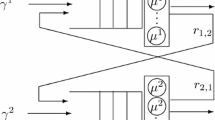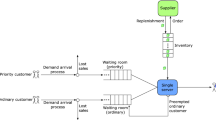Abstract
We study the stability of subcritical multi-class queueing networks with feedback allowed and a work-conserving head-of-the-line service discipline. Assuming that the fluid limit model associated to the queueing network satisfies a state space collapse condition, we show that the queueing network is stable provided that any solution of an associated linear Skorokhod problem is attracted to the origin in finite time. We also give sufficient conditions ensuring this attraction in terms of the reflection matrix of the Skorokhod problem, by using an adequate Lyapunov function. State space collapse establishes that the fluid limit of the queue process can be expressed in terms of the fluid limit of the workload process by means of a lifting matrix.
Similar content being viewed by others
References
Bernard A, el Kharroubi A (1991) Régulations déterministes et stochastiques dans le premier orthant de \({\mathbb{R}^n}\) . Stoch Stoch Rep 34: 149–167
Bramson M (1996) Convergence to equilibria for fluid models of FIFO queueing networks. Queueing Syst 22: 5–45
Bramson M (1996) Convergence to equilibria for fluid models of head-of-the-line proportional processor sharing queueing networks. Queueing Syst 23: 1–26
Bramson M (1998) Stability of two families of queueing networks and a discussion of fluid limits. Queueing Syst 28: 7–31
Bramson M (1998) State space collapse with application to heavy traffic limits for multi-class queueing networks. Queueing Syst 30: 89–148
Bramson M (2008) Stability of queueing networks. Lecture Notes in Mathematics 1950, École d’Été de Probabilités de Saint-Flour XXXVI-2006, Springer
Bramson M, Dai JG (2001) Heavy traffic limits for some queueing networks. Ann Appl Prob 11(1): 49–90
Chen H (1995) Fluid approximations and stability of multiclass queueing networks: work-conserving disciplines. Ann Appl Prob 5(3): 637–665
Chen H, Zhang H (2000) Stability of multiclass queueing networks under priority service disciplines. Oper Res 48(1): 026–037
Dai JG (1995) On positive Harris recurrence of multiclass queueing networks: a unified approach via fluid limit models. Ann Appl Prob 5(1): 49–77
Dai JG, Meyn SP (1995) Stability and convergence of moments for multiclass queueing networks via fluid limit models. IEEE Trans Aut Cont 40(11): 1889–1904
Delgado R (2008) State space collapse for asymptotically critical multi-class fluid networks. Queueing Syst 59: 157–184
El Karoui N, Chaleyat-Maurel M (1978) Un problème de réflexion et ses aplications au temps local et aux équations différentielles stochastiques sur \({\mathbb R}\) . Cas continu, Société Mathématique de France, Astérisque 52(53): 117–144
Jackson JR (1957) Networks of waiting lines. Oper Res 5: 518–521
Meyn SP, Tweedie RL (1994) State-dependent criteria for convergence of Markov chains. Ann Appl Probab 4: 149–168
Reiman MI (1984) Some diffusion approximations with state space collapse. In: Baccelli F, Fayolle G (eds) Proceedings of the internat. Seminar on modeling and performance evaluation methodology, lecture notes in control and information sciences, pp 209–240
Rybko AN, Stolyar AL (1992) Ergodicity of stochastic processes describing the operations of open queueing networks. Probl Peredachi Inf 28: 2–26
Tang J, Zhao YQ (2008) Stationary tail asymptotics of a tandem queue with feedback. Ann Oper Res 160: 173–189
Whitt W (1971) Weak convergence theorems for priority queues: preemptive resume discipline. J Appl Prob 8: 74–94
Williams RJ (1998) An invariance principle for semimartingale reflecting Brownian motions in an orthant. Queueing Syst 30: 5–25
Williams RJ (1998) Diffusion approximations for open multi-class queueing networks: sufficient conditions involving state space collapse. Queueing Syst 30: 27–88
Author information
Authors and Affiliations
Corresponding author
Additional information
Supported by project MEC-FEDER ref. MTM2009-08869.
Rights and permissions
About this article
Cite this article
Delgado, R. State space collapse and stability of queueing networks. Math Meth Oper Res 72, 477–499 (2010). https://doi.org/10.1007/s00186-010-0329-y
Received:
Accepted:
Published:
Issue Date:
DOI: https://doi.org/10.1007/s00186-010-0329-y




